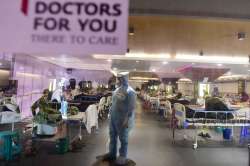No deaths due to lack of oxygen reported by states during second Covid wave: Govt
The government on Tuesday informed the Parliament that no states or union territories reported any deaths due to shortage of oxygen during the second wave of Covid-19 pandemic.

The government on Tuesday informed the Parliament that no states or union territories reported any deaths due to shortage of oxygen during the second wave of Covid-19 pandemic.
"Health is a State subject. All states/UTs report cases and deaths to Union Health Ministry on a regular basis, as per detailed guidelines for reporting deaths. No deaths due to lack of oxygen have been specifically reported by states/UTs," the ministry told the Rajya Sabha Tuesday.
Further, the ministry stressed that the Government of India supported the states and undertook a series of actions including provisioning medical oxygen, and other consumables to ensure clinical care of COVID-19 patients in view of steep rise of COVID-19 trajectory in the country during April- May 2021. The ministry told the upper house that it had to step in to facilitate equitable distribution of oxygen to the states.
"The supply of medical oxygen to hospitals is determined by contractual arrangements between the concerned hospital and the medical oxygen supplier. However, due to unprecedented surge in demand of medical oxygen during the second wave – the demand in the country peaked to nearly 9000 MT as compared to 3095 MT during the first wave – the Central Government had to step in to facilitate equitable distribution to the States," it said.
In a separate verbal response in the Rajya Sabha, Mansukh Mandaviya explained that the government's job was to publish the data submitted by the states, and that they didn't ask anyone to show lesser figures.
"Centre compiles and publishes the data sent in by state govts. Our work is to publish that data, and nothing else. We haven't told anyone to show less numbers (of deaths) or less positive cases. There's no reason for that. PM had said the same in meetings with CMs." Mandaviya said.
Addressing a press briefing late evening, the Health Ministry urged citizens to avoid social, religious, political gatherings and discourage non-essential travels. It said that people should travel only if they are fully vaccinated.
Meanwhile, the Indian Council of Medical Research (ICMR) favoured reopening of schools.
"Children can handle viral infection much better; it would be wise to consider reopening primary schools first," the body said.
ICMR DG Dr Balram Bhargava informed that the fourth round of national serosurvey was conducted in 70 districts in June-July and included children of 6-17 years of age.
"Overall seroprevalence is 67.6% in the entire population. In people of 6-9 years age group, it was 57.2 per cent; in 10-17 years, it was 61.6 per cent; in 18-44 years, it was 66.7 per cent; in 45-60 years, it was 77.6 per cent," he said.
Bhargava said there was no difference in seroprevalence in male and female and rural and urban areas. In unvaccinated, the seroprevalence was 62.3 per cent and with one dose of vaccine, it was 81 per cent. In those who receive both doses, it was 89.8 per cent, he said.
As many as 7,252 healthcare workers were studied and 10% had not taken the vaccine, the overall seroprevalence in them was 85.2%, he told reporters here. In conclusion, 2/3rd of general population i.e above the age of 6 yrs had SARS-CoV-2 infection, Bhargava said.
Raising an alarm, the ICMR DG said that about 40 crore of the population of the country was still vulnerable.
"More importantly, a third of the population did not have antibodies i.e 40 crore of the population of the country is still vulnerable," he said.
READ MORE: Over 41 crore Covid vaccine doses administered in India so far: Govt